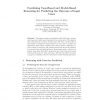279 search results - page 8 / 56 » Learning and reasoning about interruption |
IJMMS
2007
13 years 7 months ago
2007
Predicting when a person might be frustrated can provide an intelligent system with important information about when to initiate interaction. For example, an automated Learning Co...
BSN
2006
IEEE
14 years 1 months ago
2006
IEEE
Ubiquitous computing has established a vision of computation where computers are so deeply integrated into our lives that they become both invisible and everywhere. In order to ha...
RSFDGRC
2005
Springer
14 years 28 days ago
2005
Springer
Abstract. We present a rough set approach to vague concept approximation within the adaptive learning framework. In particular, the role of extensions of approximation spaces in se...
COGSCI
2004
13 years 7 months ago
2004
Previous research suggests that children can infer causal relations from patterns of events. However, what appear to be cases of causal inference may simply reduce to children rec...
ICCBR
2003
Springer
14 years 20 days ago
2003
Springer
This paper presents an algorithm called IBP that combines case-based and model-based reasoning for an interpretive CBR application, predicting the outcome of legal cases. IBP uses ...

